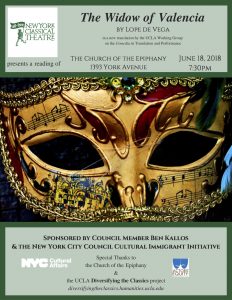STAGED READING OF THE WIDOW OF VALENCIA IN NEW YORK
On June 18, 2018 at 7:30pm at the Church of the Epiphany (1393 York Avenue), New York Classical Theatre will present a staged reading of our translation of Lope de Vega’s The Widow of Valencia. Stephen Burdman directs this performance of Lope’s play about female autonomy, the social constraints on love, and the performativity of gender roles. The reading is sponsored by The New York City Council Cultural Immigrant Initiative and city councilmember Ben Kallos. Entrance is free.
The Church of the Epiphany, 1393 York Avenue, New York, NY 10021.
For more information, please visit: http://www.newyorkclassical.org/the-widow-of-valencia/
Like this event on Facebook: https://www.facebook.com/events/233544880561482/




